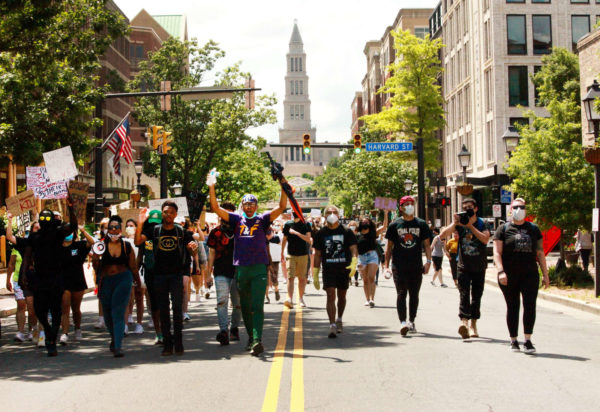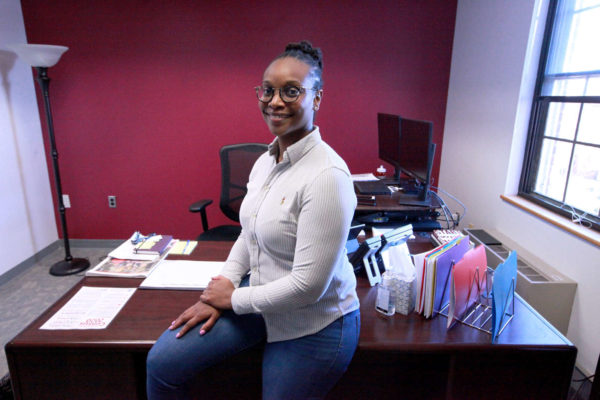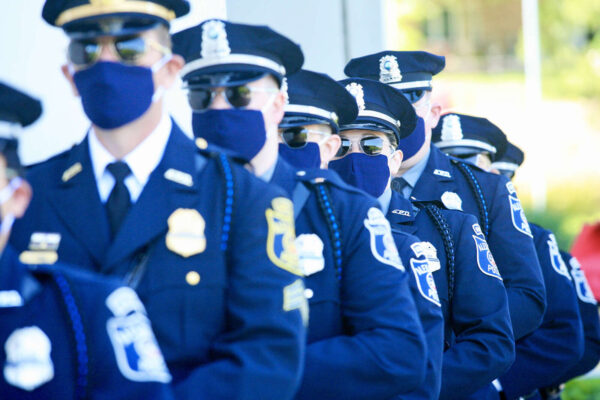
Despite previous commitments to diversity, including recruitment efforts and leadership from a Black chief of police, the Alexandria Police Department is contending with diversity issues.
Officers tell ALXnow a reorganization that occurred after Chief Don Hayes stepped into his leadership role in 2021 rewarded close connections and disregarded officers of color and civilian staff, which they say is a sign that Hayes does not want to make waves.
Now, most of APD’s leadership remains white and officers of color say they are being passed over.
“The way it’s set up now, the department’s leadership will be completely white for 20 years,” said an APD employee who spoke anonymously. “[The chief’s] actions always seem to have an adverse effect on employees of color.”
The department’s leadership of sergeant through captain is mostly white, with people of color making up a relatively small percentage. APD has no non-white captains or detectives, and only 10 sergeants of color out of 38 sergeant positions, according to a staffing directory provided by APD.
The two highest-ranking Black women in the department are sergeants, per the directory. There are no Asian officers above the rank of sergeant, and there is only one Hispanic lieutenant.
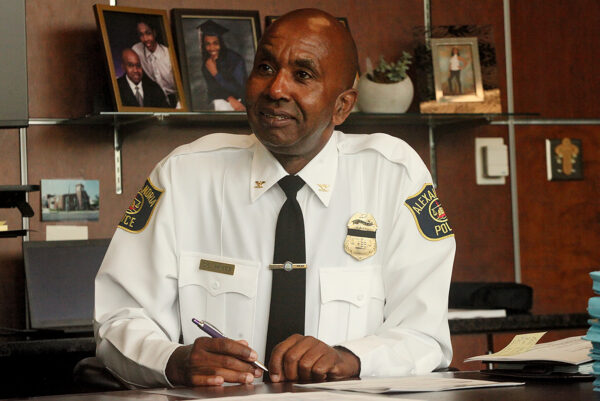
Some officers have tried many avenues for addressing this, including ethics complaints, meetings with Hayes and possibly unionizing, but have not gotten anywhere, fearing retaliation.
“I have thought about leaving,” a APD employee said. “Why should I go for a promotion? I want to get my money and I just want to go home and be left alone when I’m off the clock.”
ALXnow interviewed nine employees who spoke under the condition of anonymity out of fear of retaliation. Those employees alleged that recent departmental actions aren’t simply an oversight, but instead a concentrated effort against minorities. Hayes declined to be interviewed on diversity and his restructuring over the course of the last two months by ALXnow.
“There are great people, employees, officers and civilian staff that work at APD,” an employee said. “But there are also some very rotten ones. And unfortunately, some of those rotten ones work in the middle management and leadership. And they have an impact on the morale and the culture of the organization.”
“Unfortunately, unless someone ever notices it, it’s just gonna be a slippery slope,” the employee continued. “If they’re all there, the turnover is going to be high.”
Staff also feel like Hayes could have been a mentor, but is alienating them and not often present due to his other duties as a pastor. Since last summer, Hayes has been interim pastor at Mount Zion Baptist Church in Arlington.
The fallout from a lack of diversity in middle management is something that people who specialize in diversity initiatives say is a key hindrance to changing the status quo.
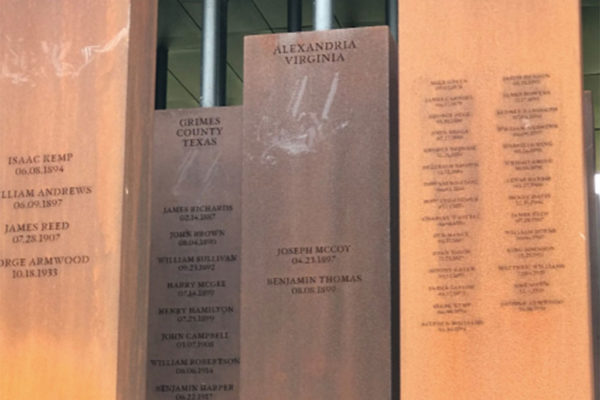
The Alexandria Community Remembrance Project (ACRP) has organized a pilgrimage to the Equal Justice Initiative’s National Memorial for Peace and Justice and Legacy Museum next month, and today (Tuesday) is the last chance for locals to register to join the trip.
Community members will transport soil from where two Black Alexandrians were lynched. The trip will involve visits to historical sites around Alabama and evening programs with guest speakers.
“You can choose to travel with us by bus from Alexandria, or you can join us in Montgomery,” the city website said. “This trip, October 6-10, includes chartered busses, discounted hotel stays, curated social justice tours, most meals and two evening programs with guest speakers.”
Joining the trip will also enroll members in the Alexandria Community Remembrance Project.
“We hope that you will join us in the future, as we continue to meet, educate, reflect and build a more inclusive and equitable Alexandria,” the website said.
Trips with independent travel are $485 or $585 to join on the chartered bus. Those interested in supporting the trip can donate online.
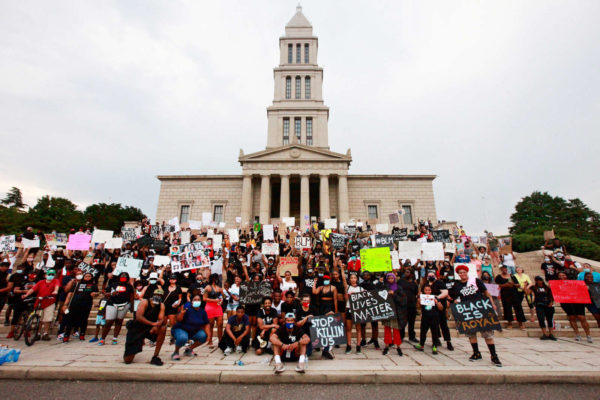
A new grant-funded program is coming to Alexandria this fall to help parents talk to children about issues around race and privilege.
The program, called Conversations About Race & Belonging, is run through a local organization called Open Horizon and is launching in Alexandria this fall.
“This program invites parents of K-12 students in Alexandria’s public and independent schools to learn skills to engage in meaningful conversations that often feel challenging, awkward and uncomfortable, using race, identity, and privilege as a focusing lens,” the release said. “We also are promoting this program to parents who are professional librarians, counselors, coaches, and building staff within those Alexandria systems that serve children, regardless of where their children go to school.”
The release said part of the goal is to engage networks, like neighbors or members of social groups, and the city is encouraging those groups to attend together to support one another.
The program page said a nominal fee of $25 is asked but not required. The next round of applications is scheduled to close on July 31.
“We are registering participants, but are limited to 30 seats, so we invite you to please share this opportunity with any Alexandria parents who might be interested, either for themselves or for other parents in their social, school, neighborhood or faith groups,” the release said. Details about the program, as well as the registration link, can be found online at this Parents Program info sheet.”
The fight to preserve Douglass Cemetery — “While the location’s rich past and personal connection served as an emboldening force for Johnson, he said he’s sorry that anyone’s final resting place could wind up in such a dilapidated state.” [Alexandria Times]
Advice from Old Town Books’ Ally Kirkpatrick — “We talked to Ally Kirkpatrick, founder and owner of Old Town Books, about curling up with a good read when the weather gets cold and finding the perfect book to give as a gift.” [Alexandria Living Magazine]
City of Alexandria Receives Perfect Score on 2021 Municipal Equality Index — “The Human Rights Campaign (HRC) Foundation and Equality Federation Institute have announced that the City of Alexandria is one of 110 cities in the U.S. to receive the maximum possible score of 100% on the 2021 Municipal Equality Index (MEI)” [Zebra]
It’s a different world than when Jacqueline Tucker started work in Alexandria.
Tucker started her job as the city’s first-ever racial and social equity officer in February 2020, and in the months that followed the pandemic and social unrest shook the city to its core.
“It’s a completely different world,” Tucker told ALXnow. “I think that at a minimum that our awareness and consciousness is raised.”
After overseeing racial and social equity training for approximately a third of the city’s workforce, Tucker is offering training to residents for the first time in the 30-Day Racial Equity Challenge. The four-part program started last month, and every day participants complete short assignments, like watching a TED Talk or taking an implicit bias test. The goal is for participants to walk away with a broader understanding of racial bias in the community.
The weekly conversation on the program continues in a Zoom conversation at noon on Wednesday, June 30.
The four-week program is being done in partnership with ACT for Alexandria, and currently has about 30 participants (with 80 signed up) focusing on history, micro aggressions, systemic and institutional racism and what they can do about it.
“It’s designed to be sort of a primer for scratching the very tip of a surface on some of the main issues related to race and equity,” Tucker said.
The format is slightly different than what’s offered to city employees. So far, all 700 Department of Community and Human Services staffers have received initial training from the Government Alliance on Race and Equity, in addition to all city department heads. That training mostly focuses on government’s role in systemic and institutional bias and racism, and each department has an equity team focused on training their staff.
Tucker’s next step is creating an “opportunity map or an equity index map” to show disparities within communities on a public dashboard.
Jaqueline Tucker’s head is still spinning. After a little more than two weeks on the job, she knows that she has her work cut out for her as Alexandria’s first-ever racial and social equity officer.
Tucker’s calendar is filling up. She’s currently meeting with department heads and just finished training with the department of community and human services. Her initial goal is to ensure that all Alexandria government employees receive racial equity training by the first quarter of next year.
“We’ve had a norm for generations that is white and male, cisgendered, and that is in the psyche of all people of color who have been historically marginalized. This has happened for generations. Our policies and our practices have been designed and set up to perpetuate those systems,” Tucker told ALXnow. “I think it’s in the consciousness of any person of color or any marginalized person.”
Alexandria has made inroads into eliminating racial and social bias over the last several years with its interdepartmental racial equity working group. Until recently, the effort was led by Deputy City Manager Debra Collins, who says that Tucker has ambitious goals.
“We’re all here to help. She’s got an army ready to work with her, and the good news is that the city has been on this journey for the last couple of years,” Collins said. “I mean, think about it. Somewhere years ago somebody said that it was okay to put a maintenance yard over African American graves in Fort Ward, right? That was a government decision at some point in the ’50s or ’60s. Or the gas station that was sitting on top of Contrabands and Freedmen Cemetery. That was something that a planning director authorized back in the day.”
Tucker, a native of Grand Rapids, Michigan, has a bachelor’s degree in political science from Butler University and a law degree from Howard University. Her father’s family moved to Michigan from Mississippi because of threats that they were going to get lynched, and she recalls her first taste of racial inequity was when she was 11 years old. She was on a basketball team with local a amateur athletic union league and most of the players on her team were white.
“It was myself and one other black girl,” she said. “This started at about age 11, and my personal belief is that I was one of the better players at the time… but there came like an issue of like, whether I should be a starter and my father said to me, ‘It’s just politics.’ And then for an 11-year-old, you have no idea what that really means, but ever since then I knew I wanted to be involved in politics.”
For the last two years, Tucker was the east region project manager with the Government Alliance on Race and Equity, and, in fact, met many of Alexandria’s leaders when she conducted a half-day racial equity training retreat with the Metropolitan Washington Council of Governments.



